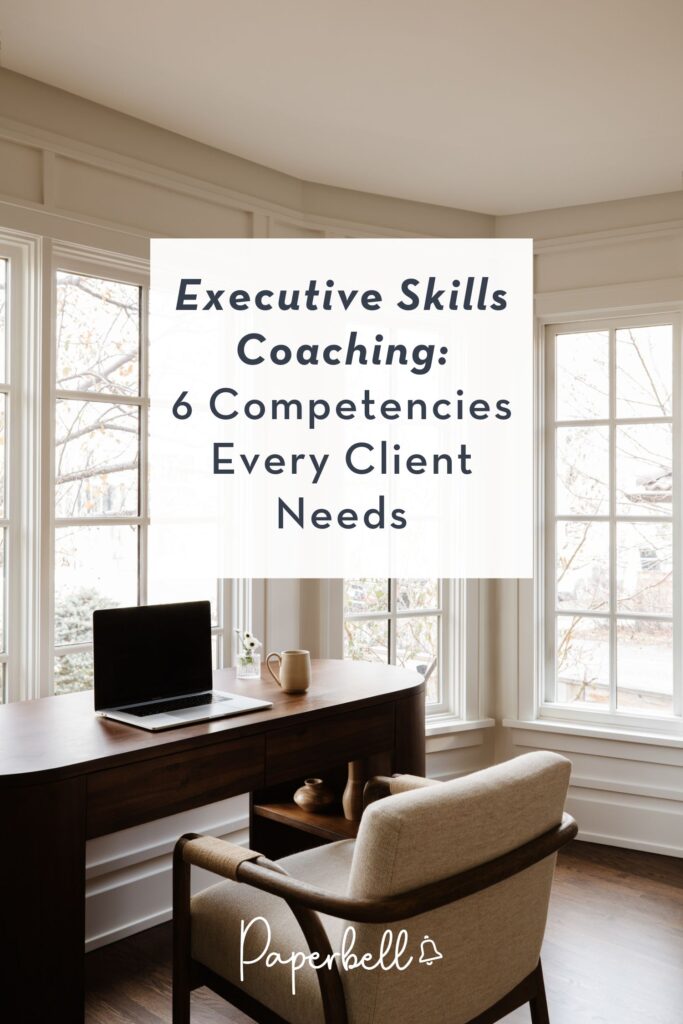Executive skills coaching helps leaders grow into the best version of themselves to create a positive impact. Whether you’re just starting out as a coach or want to specialize further, this guide breaks it all down.
Read on to learn:
- What executive skills coaching involves
- How it’s different from other, similar specialties
- Who needs it beyond CXOs
- How to start building a practice in this niche
What Is Executive Skills Coaching?
Executive skills coaching is a specialized form of professional development for leaders. It helps them refine the skill sets needed to perform at their best in complex business situations and lead confidently.
Unlike general coaching, which may focus on personal growth or mindset shifts, this specialty is zeroing in on the basic skills that make a leader effective.
So, for example, life coaches tend to focus on helping clients find clarity in their personal lives. Career coaches are all about navigating job transitions.
Executive skills coaches, on the other hand, typically work with mid-to-senior-level executives who want to become better leaders and decision-makers.
While executive coaching may have a broader scope (exploring personal values, learning management frameworks), executive skills coaching zooms in on practical competencies like:
- Executive presence and influence: Presenting ideas with confidence and being persuasive in negotiations.
- Decision-making under pressure: Balancing risk, strategy, and speed in high-stakes situations.
- Time management and prioritization: Maximizing efficiency while avoiding burnout.
- Delegation and team management: Leading teams and improving their performance.
Who Can Benefit from Executive Skills Coaching?
Executive skills coaching is often associated with C-suite leaders, but it’s not just for those at the very top. Organizations invest in this type of coaching for:
- Emerging leaders: High-potential employees who need to uplevel their skills to step into leadership roles.
- Mid-level managers: Professionals who are transitioning from managing tasks to managing people and strategy.
- Senior executives: Leaders who want to refine their skill set and handle major business challenges better.
Executive skills coaching can be a game-changer for leaders at all levels. It’s a structured way to break through career plateaus, boost confidence, and become more effective day-to-day.
A leader’s personal growth directly affects not just their own performance but their team’s too, as well as the way they collaborate with other stakeholders. Because of this, organizations invest in executive skills coaching to:
- Strengthen their leadership pipelines: Preparing the next generation of competent leaders ready to take on bigger roles.
- Improve company output: Effective leaders delegate well and make solid decisions. This drives better results for their teams and departments, which greatly impacts the company’s bottom line.
- Retain top talent: Employees, understandably, are more likely to stay in companies that invest in their growth.
6 Skills Every Executive Needs to Master
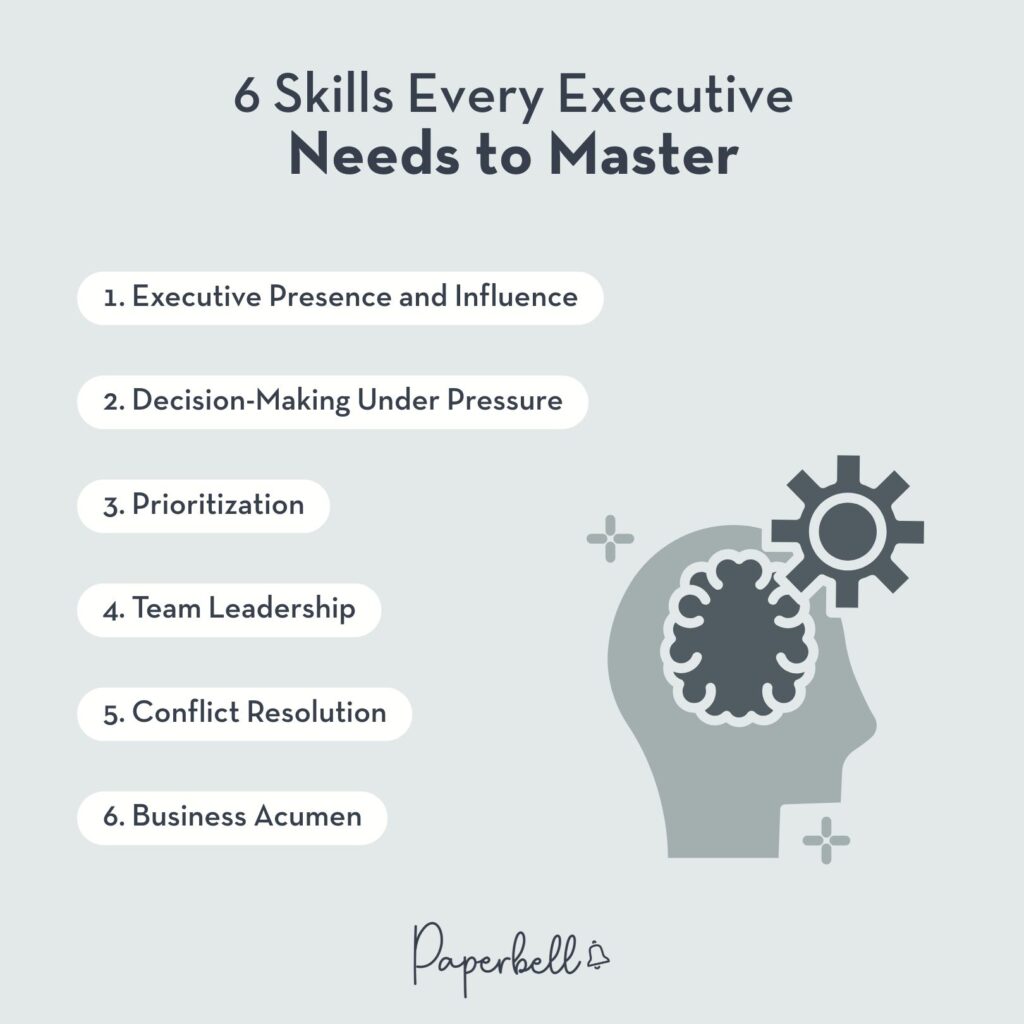
Stepping into a new leadership role comes with different challenges for every client. Your job as a coach is to pinpoint where they need to grow the most and bring out the best in them. Here are a few essential skills executives commonly need coaching on.
1. Executive Presence and Influence
Executive presence is about how leaders carry themselves, communicate, and inspire confidence. That means handling high-pressure meetings with composure, getting one’s point of view across, and being able to hold space for healthy arguments.
It doesn’t necessarily mean being the loudest in the room, but knowing how to engage others and shape conversations so people follow your lead.
2. Decision-Making Under Pressure
Executives sometimes need to make urgent decisions without having all the information and might not have the luxury to analyze their options extensively. They must assess risks quickly, weigh competing priorities, and commit to a course of action that may affect an entire company.
Beyond gut instinct, they need to interpret data points and know when to bring in expert opinions they can trust. Coaching helps leaders develop a structured approach to decision-making so they can keep moving forward with confidence, even when the stakes are high.
3. Prioritization
An executive’s to-do list is never-ending. There will always be another email to answer, another meeting to attend, another crisis to handle. The best leaders don’t try to do it all; they figure out what truly moves the needle and focus their energy there.
That means learning how to set priorities, delegate effectively, and create boundaries that protect their time. Without these skills, even the most talented leaders risk burnout and inefficiency. Coaching helps them build these competencies and stay focused on the big picture rather than getting bogged down into firefighting small issues.
4. Team Leadership
Executives aren’t just responsible for their own work but also for getting the best out of everyone around them. That means learning to delegate strategically, giving the people they manage the right level of autonomy, and providing clear feedback that helps them grow.
Many leaders struggle with letting go of tasks, either because they don’t trust others to do them better or because they think it’s faster to do things themselves. But strong leadership is about empowerment, not micromanagement. Coaching helps executives shift their mindset to build high-performing teams instead of trying to do everything on their own.
5. Conflict Resolution
Executives have to deal with difficult conversations, like giving tough feedback or handling conflicts in their teams. They need to be firm but also listen actively and put their biases aside. Even use a bit of coaching from time to time to find common ground.
Their coaches can help them pick up some foundational coaching skills and communication techniques to lead conversations effectively.
6. Business Acumen
Industry knowledge is crucial for an executive. Understanding the metrics they’re aiming for, the trends that shape the market, as well as present challenges and opportunities.
A leader with solid business acumen makes decisions with the big picture in mind and can spot patterns others might miss. They help their company get through times of transition and stay ahead of the curve.
Executive Function Coaching vs. Executive Skills Coaching
When you hear the terms “executive function coaching” and “executive skills coaching,” they might sound similar, but they actually target very different skills and are relevant for different clientele.
Executive Function Coaching improves the brain’s ability to manage the mental processes that help us stay organized, plan ahead, stay focused, and execute tasks. It’s the “control center” of the mind that helps people stay productive.
Executive function skills are especially helpful for people who struggle with things like time management, prioritization, or emotional regulation.
Many neurodivergent individuals (such as those with ADHD or on the autism spectrum) and people with mental health issues face executive function challenges. However, it’s not limited to them; executive function coaching can benefit anyone who feels overwhelmed by tasks or finds it hard to stay on track.
So, while this might seem like something you’d associate with high-powered execs, it’s not exclusive to that role. It’s for anyone who needs to juggle multiple tasks successfully and stay focused.
In contrast, Executive Skills Coaching builds practical skills—the ones we discussed above—that help CXOs thrive in their careers. Sure, if an exec struggles with executive function (like prioritization or regulating emotions), then executive function support can be incorporated into their executive skills coaching process.
Simply put, executive function coaching helps you get your brain to focus, while executive skills coaching teaches you how to use those self-management skills to become a better leader. The former has a broader client pool while the latter is more focused on the client’s abilities required by their job title.
Do You Need Certification to Become an Executive Skills Coach?
Not necessarily, but it helps you build expertise and credibility.
Many successful executive business coaches build their careers through real-world leadership experience and proven results with clients, rather than formal credentials.
But if you’re transitioning into this space or want to boost your credibility with corporate clients, an executive coaching certification can open doors, especially with organizations that value structured credentials.
Here are three options for getting certified as an executive skills coach:
1. Center for Executive Coaching
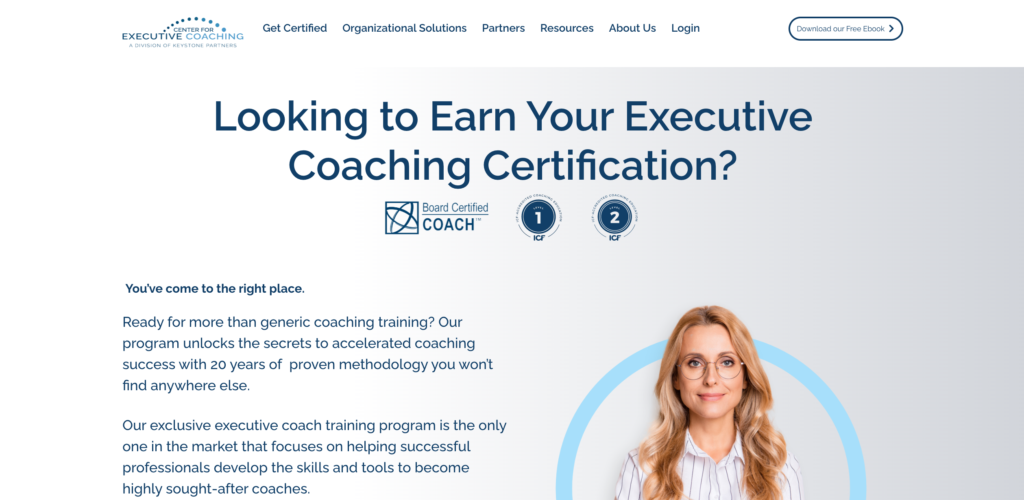
Programs at the Center for Executive Coaching offer practical frameworks you can use right away in your practice for skills development. Their various certification paths offer different levels of Executive Coach Certification (CEC) and International Coaching Federation (ICF) certifications, either through in-person or live online classes.
Price: $5,490-10,780 depending on the program
Duration: 2–6 months depending on the program
2. Coach Training Alliance
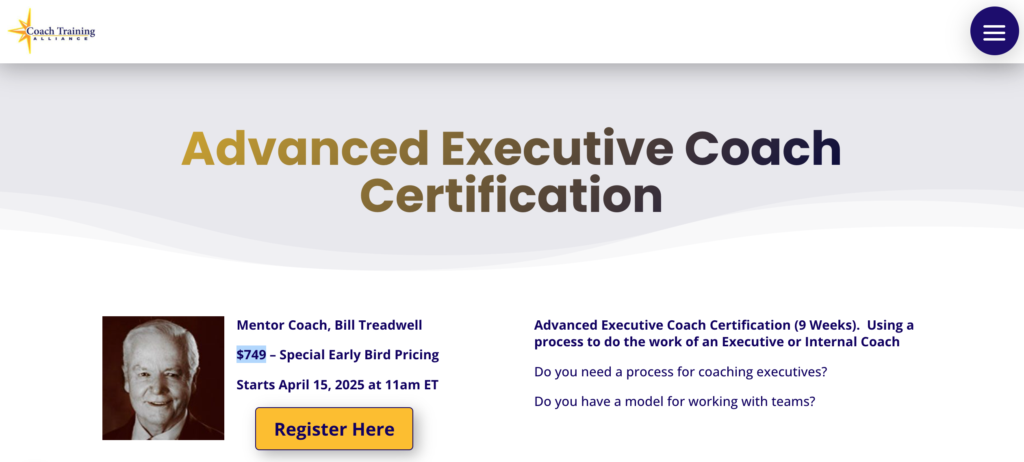
The Coach Training Alliance offers an ICF-accredited advanced program specialized in executive coaching, built on the MORE Model (Model for Organizational, Resource Development and Executives).
Though more affordable, it’s a follow-up course to a foundational coaching certification covering core coaching competencies. This course combines 90-minute live online classes and around 12 hours of self-study.
Price: $749 with early bird pricing
Duration: 9 weeks
3. Hudson Institute of Coaching
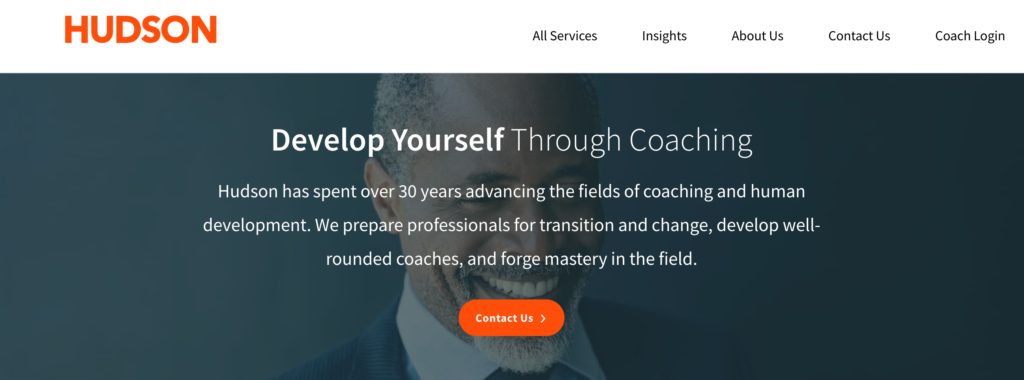
Hudson’s coach certification is ideal if you’ve been in business for a while and want to go deeper into leadership development and human behavior. It blends coaching competencies and organizational psychology.
It’s a 9-month, ICF Level 2 program that includes three four-day intensive sessions and weekly group practices. It’s geared toward 50+ senior professionals with 10-20 years of experience.
Price: $15,500
Duration: 9 months
Ultimately, a certification isn’t everything, but if you choose one that aligns with your career goals, it can give you the tools and confidence to work with top-tier clients.
How to Create Your Executive Skills Coaching Packages
Instead of putting a price tag on your time, develop a structured, outcome-driven process that speaks to your ideal target client. Here’s how you can get started.
1. Pick a Niche
It might feel like “executive” is already niche enough, but even within the C-suite, there are distinct audiences. Are you helping first-time managers become better leaders? Supporting women in tech who are navigating high-stakes roles? Guiding execs transitioning into CEO positions?
Choosing a niche helps you zoom in on your clients’ day-to-day challenges, and it makes marketing your programs way easier too.
2. Develop Your Coaching Framework
Once you know who you’re helping, design a process that gets them results. That means using the right:
- Methodology: Whether you lean on NLP or strength-based coaching, pick tailored strategies that best support your clients’ needs.
- Assessments: Tools like 360-degree feedback, DISC, or EQ-i 2.0 can help clients understand their blind spots and track growth.
- Progress and ROI tracking: Executives (and their companies) want to know your coaching is paying off. Incorporate regular progress reviews or simple scorecards to show tangible wins.
- Accountability systems: Decide how you’ll help clients stay on track, whether that’s weekly email check-ins, shared goal-tracking apps, or a record of action steps taken before the next session.
3. Structure Your Coaching Packages
Executives are busy. They value efficiency and results, so your coaching packages should reflect that.
Think in terms of:
- Duration: 3, 6, or 12-month programs can support different approaches to leadership skills development.
- Session frequency: Weekly calls accelerate progress, while bi-weekly or monthly calls allow time for implementation while maintaining momentum in long-term programs.
- What’s included: Beyond one-on-one coaching sessions, do you want to offer chat or email support, group training, progress reports, or feedback sessions?
Once you’ve mapped this out, you can easily set up your packages with various pricing options in Paperbell, from payment plans to subscriptions.
Each of your packages will get its own customizable landing page plugged into your client management system, including digital contract signing, payment processing, session scheduling, and so on.
4. Sell Your Program
Here are a few ways you can get your coaching programs in front of the right people.
- Update your website: With Paperbell, you can skip themes, site builders, and hosting plans, and instead, simply fill in the blanks. Describe how you’ll solve the pain points of your target audience and outline the transformation they can expect.
- Leverage your network: Many executive coaches get their first few clients through referrals, so it’s worth reaching out to your contacts on LinkedIn. You may incentivize recommendations or offer a few initial pro bono sessions to build your client portfolio.
- Choose one channel at a time: Think about where your target audience is most likely to hang out and start sharing valuable content to grab their attention. Offering free lead magnets is a great way to start building your email list with qualified prospects.
At the end of the day, a solid executive leadership coaching package is less about fancy branding and more about clear positioning and proven results. Build it around what your clients actually need, and you’ll be off to a strong start.
FAQ
What Is Executive Skills Coaching?
Executive skills coaching focuses on developing the competence needed for leadership roles, like decision-making and negotiation. It helps execs drive business results and achieve goals more effectively.
Do I Need Corporate Experience to Become an Executive Coach?
Corporate experience is helpful, but it’s not a must. Successful executive coaches usually have strong coaching skills and a deep understanding of leadership across industries.
What’s the Best Way to Transition from General Coaching to Executive Coaching?
Gain expertise in core leadership competencies and the coaching techniques that help develop them. Consider taking specialized training, practice applying your coaching skills to corporate clients, and build your credibility in the executive space.
Should I Specialize in a Particular Industry or Leadership Level?
Gaining expertise in a specific industry or leadership level can help you stand out in your niche and provide more focused guidance to clients. Consider narrowing your niche down based on your interests and background, whether it’s coaching CFOs or aspiring tech leads.
Give Your Coaching Practice a Makeover
As an executive coach, your practice should be just as put together as yourself.
Paperbell handles your entire business, from your website and bookings to your payments and contracts. It neatly organizes all your client surveys and notes, automates your email communication, and saves you hours every week on admin—that you could spend on training or coaching more clients.
Try Paperbell now for free and see how it can transform your business.
